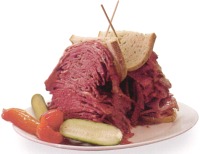 Can the Jewish Deli survive the sustainable food movement? It’s an interesting question, and one addressed by a recent story on haaretz.com. In early February, the Jewish community center in Berkeley hosted a panel discussion on the fate of delis in a world where local, seasonal eating has started to really matter to people. Michael Pollan was on hand, as were Karen Adelman and Peter Levitt, co-owners of Saul’s Deli, a kosher-style Jewish deli down the street from Alice Waters’ Chez Panisse.
Can the Jewish Deli survive the sustainable food movement? It’s an interesting question, and one addressed by a recent story on haaretz.com. In early February, the Jewish community center in Berkeley hosted a panel discussion on the fate of delis in a world where local, seasonal eating has started to really matter to people. Michael Pollan was on hand, as were Karen Adelman and Peter Levitt, co-owners of Saul’s Deli, a kosher-style Jewish deli down the street from Alice Waters’ Chez Panisse.
Adelman and Levitt make their corned beef and pastrami from local, grass-fed meat, all their fish is sustainably raised and their produce is seasonal. They also make their own celery soda:
A Jewish deli that doesn’t serve Dr. Brown’s Cel-Ray? Customers grumbled two years ago when Saul’s made the switch, but Levitt and Adelman stuck to their guns. Jewish delis always used to make their own soda, they pointed out, along with pastrami, salami and kishkes. Today, most delis buy those items boxed, bottled or frozen. So who’s more authentic?
“There was a time when Dr. Brown?s had the best soda in New York,” Levitt said. “It was the city’s de facto Jewish deli drink. Now the company is owned by Pepsi-Cola, and ConAgra Foods owns Hebrew National. The names we know are owned by industrial manufacturers.”
David Sax, author of the 2009 book Save the Deli, goes on to name Jewish delis committed to sustainability: Kenny & Zuke’s in Portland, Ore., Kaplansky’s in Toronto and the brand new Mile End in Brooklyn’s Boerum Hill neighborhood.
Well, we here in Philadelphia have Honey’s Sit ‘n Eat. It’s not a true, old school Jewish deli, but the restaurant is definitely in dialogue with that tradition—they do pastrami, brisket, latkes and awesome matzo ball soup. No one who’s ever tried to get into brunch on a Sunday morning could argue that they don’t have a viable business model.







